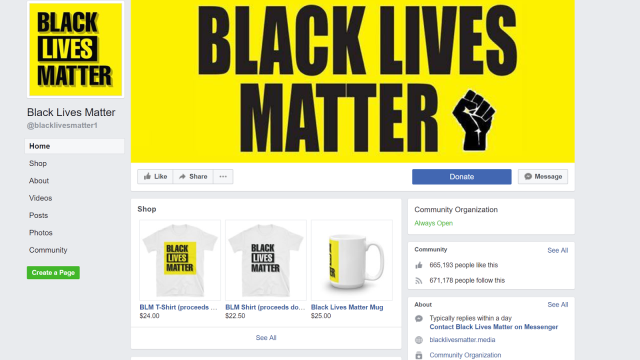What appeared to be the biggest “Black Lives Matter” page on Facebook was actually “a scam with ties to a middle-aged white man in Australia,” CNN Tech reported today, and it managed to raise over $US100,000 ($130,035) while sending some of that money to Australian bank accounts.
Screenshot: Jeremy Massler (Facebook)
Just as troubling, CNN reported that Facebook initially declined to remove the page when contacted, even as other counterparts in the industry quickly moved to do so:
Fundraising campaigns associated with the Facebook page were suspended by PayPal and Patreon after CNN contacted each of the companies for comment. Donorbox and Classy had already removed the campaigns.
…
Only after almost a week of emails and calls between CNN and Facebook about this story did Facebook suspend the page, and then only because it had suspended a user account that administrated the page.
According to the CNN report, the page had some 700,000 followers as well as a Facebook Group with 40,000 members, and did its damnedest to pry those users’ money from their wallets by appropriating Black Lives Matter’s anti-racist credentials. When CNN tried to contact the individuals behind it, they took it down. It was only later, when Facebook banned a fake account named “BP Parker” which was one of its listed administrators, that the Black Lives Matter page was also suspended.
CNN found that the page repeatedly linked to sites tied to Ian MacKay, a “National Union of Workers official in Australia”. MacKay appears on registration records for dozens of websites, including ones related to black rights such as blackpowerfist.com and blacklivesmatter.media. An unidentified source told CNN that some of the payments processed via the fundraising sites were “tied to an Australian IP address and bank account”, and MacKay’s name appeared on one.
One donation page on Donorbox made vague appeals to solicited funds going to “raise awareness about racism, bigotry, police brutality, and hate crimes”, as well as helping promote the page itself, per CNN. Another claimed to be raising funds for a “Education And Training Portal Sponsorship Fund” that would sponsor “online courses” about the civil rights movement.
Allegations about the page were first raised in December 2017 by freelance investigator Jeremy Massler, after which it briefly disappeared before being reactivated. Screenshots taken by Massler showed the page had a Facebook shop advertising Black Lives Matter shirts ($US22.50-24 [$29-31]) and mugs ($US25 [$32]).
MacKay told CNN he had only bought the domains as part of “a personal hobby”, and said, “What is the point in speaking to you given that you are going to run your story either way.”
In any case, this incident calls into question Facebook’s commitment to recently-announced policies intended to increase transparency surrounding pages at just about the worst possible time. As CNN noted, “Not for the first time, Facebook took action against a major bad actor on its site not on its own but because journalists made inquiries.”
Russian operatives allegedly ran an extensive disinformation and propaganda campaign on Facebook that reached up to 126 million Americans before the 2016 US elections, 10 million of it via paid ads. Some of the Russian accounts in question similarly purported to represent the Black Lives Matter movement or associated causes.
After months of denying and then downplaying the scale of the issue, Facebook initially said it would require anyone purchasing electoral ads to verify their accounts by listing a US address and replying to a physical mailer. It more recently announced that it will require anyone running a large page to undergo the verification process – which anyone able to gain access to a US mailing address could potentially game.
CEO Mark Zuckerberg will testify before US Congress this week on both the Russian issue and a separate scandal involving Cambridge Analytica, the shady election data firm and Donald Trump campaign vendor which allegedly partnered with an app that harvested extensive data on at least 87 million Facebook users without their consent.
In that case, too, when Facebook learned years ago they had lost control of the user data, they allegedly responded by mailing the company a form to check off certifying it had been destroyed. Not all that different than a postcard.
[CNN Tech]
